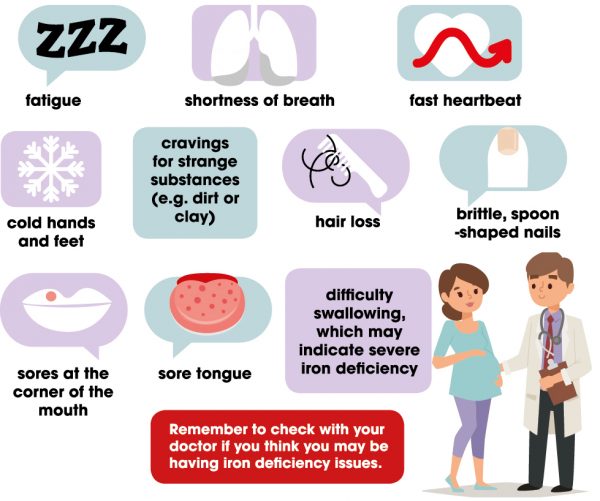
Signs of Iron Depletion in Pregnancy
Iron is an essential mineral that plays a crucial role in various physiological processes, including oxygen transport, red blood cell production, and DNA synthesis. During pregnancy, the demand for iron increases significantly to support the growth and development of the fetus and placenta. Iron deficiency, a common complication during pregnancy, can have detrimental effects on both the mother and the baby.
Causes of Iron Depletion in Pregnancy
- Increased fetal demand: The developing fetus requires a substantial amount of iron for growth and development.
- Increased maternal blood volume: During pregnancy, the mother’s blood volume increases by up to 50%, diluting the available iron stores.
- Inadequate dietary intake: Many pregnant women do not consume enough iron-rich foods to meet their increased needs.
- Certain medical conditions: Conditions such as celiac disease, Crohn’s disease, and heavy menstrual bleeding can impair iron absorption or increase iron loss.
Signs and Symptoms of Iron Depletion
Iron depletion in pregnancy can manifest in a range of signs and symptoms, including:
- Fatigue and weakness: Iron deficiency can lead to a decrease in red blood cell production, resulting in anemia. Anemia can cause fatigue, weakness, and shortness of breath.
- Pale skin and mucous membranes: Iron deficiency can cause the skin and mucous membranes to appear pale due to a lack of hemoglobin, the iron-containing protein in red blood cells.
- Brittle nails: Iron deficiency can weaken the nails, making them brittle and prone to breaking.
- Restless legs syndrome: Iron deficiency can contribute to restless legs syndrome, a condition characterized by an irresistible urge to move the legs, especially at night.
- Cognitive impairment: Severe iron deficiency can affect cognitive function, leading to difficulty concentrating, memory problems, and mood changes.
- Increased risk of preterm birth and low birth weight: Iron deficiency has been associated with an increased risk of preterm birth and low birth weight.
Diagnosis of Iron Depletion
Iron depletion is diagnosed based on a combination of symptoms, physical examination findings, and laboratory tests. The following tests may be used:
- Complete blood count (CBC): A CBC measures the number of red blood cells, hemoglobin levels, and hematocrit (the percentage of red blood cells in the blood).
- Serum iron and ferritin levels: Serum iron levels measure the amount of iron circulating in the blood, while ferritin levels indicate the body’s iron stores.
- Transferrin saturation: Transferrin saturation measures the percentage of transferrin, a protein that transports iron in the blood, that is bound to iron.
Treatment of Iron Depletion
Treatment for iron depletion in pregnancy typically involves oral iron supplements. The recommended daily dose of elemental iron during pregnancy is 27 mg. Iron supplements should be taken with food to enhance absorption.
In severe cases, intravenous iron therapy may be necessary to rapidly replenish iron stores.
Prevention of Iron Depletion
Preventing iron depletion in pregnancy is crucial for the health of both the mother and the baby. The following measures can help prevent iron deficiency:
- Consume iron-rich foods: Include iron-rich foods in your diet, such as red meat, fish, poultry, beans, lentils, and leafy green vegetables.
- Take prenatal vitamins: Prenatal vitamins typically contain iron to supplement dietary intake.
- Avoid caffeine and tannins: Caffeine and tannins can interfere with iron absorption.
- Cook in cast iron cookware: Cooking in cast iron cookware can increase the iron content of food.
- Consider iron supplementation: If you have a history of iron deficiency or are at high risk for iron depletion, talk to your healthcare provider about iron supplementation.
Conclusion
Iron depletion is a common complication during pregnancy that can have significant consequences for both the mother and the baby. Recognizing the signs and symptoms of iron depletion is essential for timely diagnosis and treatment. By taking preventive measures and following treatment recommendations, pregnant women can ensure adequate iron intake and minimize the risks associated with iron deficiency.